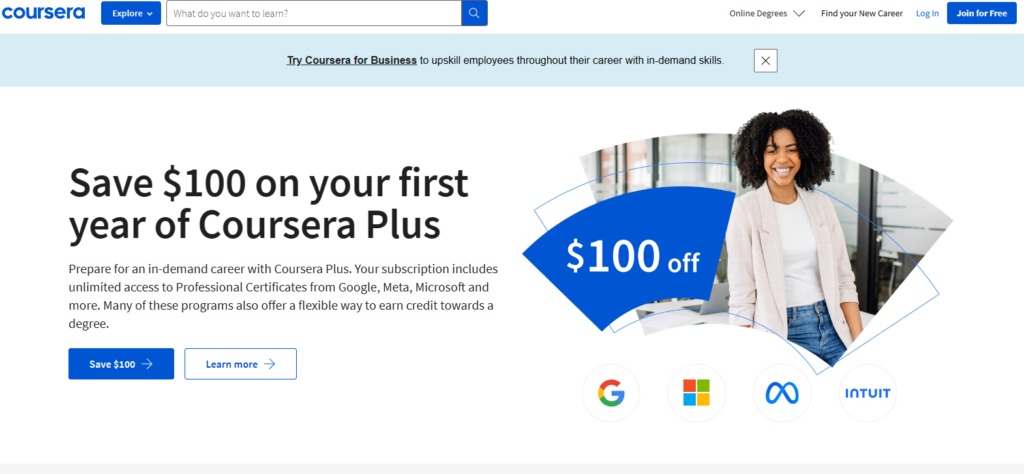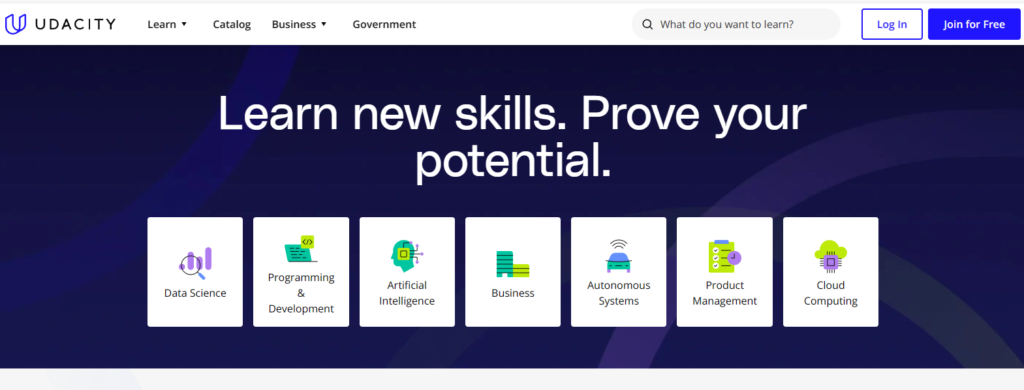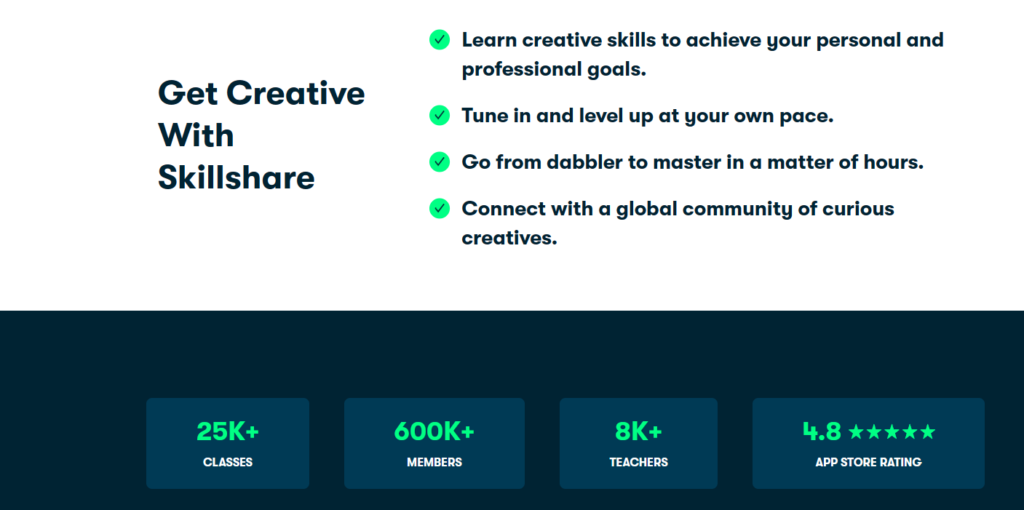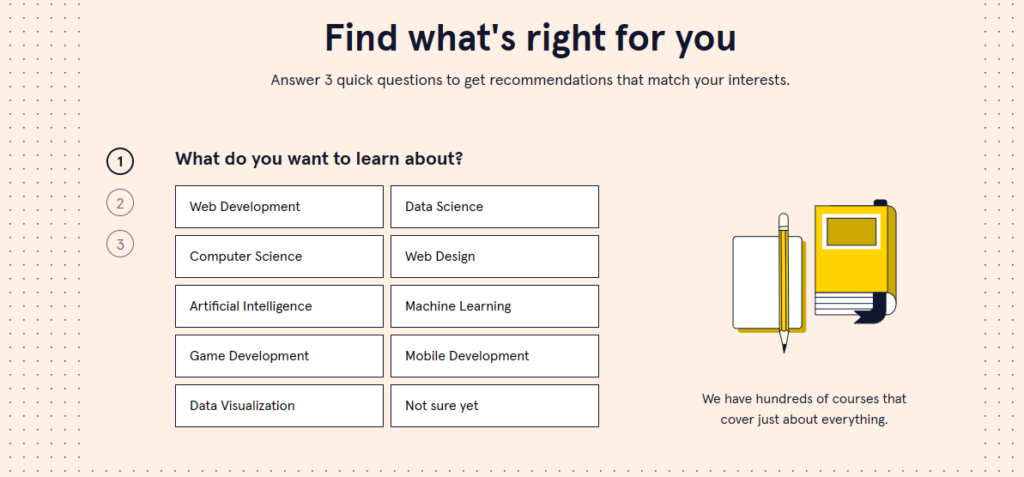Introduction: 5 Udemy Alternatives Comparision In 2024
As someone who has utilized Udemy for various learning endeavors, I’ve genuinely valued its expansive array of courses and the flexibility it offers. The platform’s accessibility and affordability made it an attractive choice for picking up new skills on my terms. However, over time, I encountered some limitations, particularly concerning the inconsistent quality among courses and the absence of formal accreditation for completed courses. These drawbacks prompted me to seek alternative platforms that could better align with my educational goals and provide a more consistent learning experience. In today’s blog, I will share five alternatives I found: Coursera, edX, Skillshare, Codecademy, and Udacity, each offering unique features that cater to different learning preferences and objectives.
Udemy Advantages & Challenges
Advantages:
- Unrestricted Access: The promise of lifetime access to purchased courses means that learners can proceed at their own pace, revisiting and refreshing their knowledge as needed over time.
- Flexible Investment: With a no-questions-asked, 30-day refund policy, Udemy stands behind the value of its courses, offering learners a safety net for their educational investments.
- Complimentary Learning Opportunities: The platform enriches the educational ecosystem with a selection of free courses, inviting learners to explore new domains at no cost.
- Economical Education: Udemy democratizes learning by offering courses within a price range that accommodates most budgets, breaking down financial barriers to education.
Challenges:
- Content Creation and Control: The responsibility of course creation lies with individual instructors, which, despite Udemy’s quality checks, raises questions about the consistency and depth of the educational content.
- Content Quality Variance: The quality of Udemy’s courses can fluctuate due to its open platform for instructors, necessitating a cautious approach from learners to ensure the courses meet their standards.
- Educational Credentials: While Udemy’s certificates of completion acknowledge personal achievement, the lack of formal accreditation might not meet the criteria required for academic or professional advancement.
- Abundance of Choices: The sheer breadth of courses available, spread across numerous categories and sub-categories, can sometimes feel daunting, making it challenging for learners to pinpoint the most suitable options.
| Platform | Price Range | Pros | Cons | Best For |
| Coursera | Free courses; Specializations start at $49/month; Degrees start at $9,000 | University partnerships; Accredited certificates; Wide range of subjects | Pricing can be confusing; Some courses require prior knowledge | Learners seeking formal education with university accreditation |
| edX | Free courses; Professional education starts around $50-$300; MicroMasters and Master’s Degrees vary | University-level courses; Accredited programs; Wide variety of subjects | Focus on academic subjects; Some programs can be expensive | Those looking for academic, university-led courses and degree programs |
| Skillshare | Free for basic; Premium at $99/year or $19/month | Creative and interactive courses; Community engagement; Project-based learning | Mostly creative and entrepreneurial niches; Quality varies by course | Creative professionals and hobbyists seeking skill improvement and community feedback |
| Codecademy | Free limited access; Pro membership at $19.99/month if billed annually | Interactive learning platform for coding; Structured learning paths | Focuses solely on coding and programming; No accredited certificates | Aspiring developers and those interested in tech skills |
| Udacity | Nanodegrees start at approximately $249 per month | Tech-oriented courses with real-world projects; Mentor support | Higher cost; Focused primarily on tech and vocational skills | Professionals and students aiming for specialized tech skills and careers |

Coursera: Elevating Online Learning
Coursera, co-founded by Stanford professors, distinguishes itself in the e-learning space by partnering with top universities and organizations to offer a vast range of courses, specializations, and degrees. With over 6,000 courses, including 760+ Guided Projects and 2,250+ Specializations, Coursera caters to a wide audience, from casual learners to professionals seeking accredited certificates and degrees from prestigious institutions.
Coursera vs. Udemy: Key Differences
Coursera sets itself apart from Udemy with content often developed by university professors, ensuring high quality and structured learning experiences. Unlike Udemy’s vast but varied-quality course offerings, Coursera focuses on academic rigor and offers accredited certifications, bridging online learning with formal education.
Who Fits Best with Coursera?
Coursera is ideal for those prioritizing educational quality and formal recognition of their achievements. It suits students and professionals aiming for in-depth knowledge and skills in specific fields, offering everything from quick projects to full degree programs.
Advantages of Coursera
- Accredited Certificates and Degrees: Elevates the value of your learning with recognized achievements.
- High-Quality Learning: Courses by university professors guarantee depth and quality.
- Global Reach: Partnerships with global institutions offer diverse learning opportunities.
Considerations
- Structured Courses: Offers less flexibility compared to more open platforms.
- Access Restrictions: Mainly available to those affiliated with partner institutions.
Why Choose Coursera Over Udemy?
Choosing Coursera over Udemy appeals to those prioritizing formal education and recognized qualifications. Coursera partners with leading universities, offering accredited courses and degrees that boost your resume’s credibility. Its structured learning paths and comprehensive subject coverage are ideal for learners seeking in-depth knowledge with academic rigor. For those focused on career advancement and educational quality, Coursera stands out as the preferred choice.

Udacity: Specializing in Tech and Career Advancement
Udacity distinguishes itself as a unique entity in the realm of online education, focusing intensely on technical and career-oriented training. This platform is particularly renowned for its Nanodegree programs, designed in collaboration with leading tech giants such as Google, AWS, Mercedes, and Nvidia, to offer in-depth knowledge and practical skills in high-demand fields.
Udacity vs. Udemy: Distinctive Paths
While Udemy provides a broad spectrum of courses across various fields, Udacity zeroes in on technology and business, offering specialized Nanodegrees aimed at equipping learners with job-ready skills. This specialization is supported by Udacity’s partnerships with industry leaders, ensuring the course content is cutting-edge and relevant.
Detailed Udacity vs. Udemy Review
Ideal Candidates for Udacity
Udacity is best suited for individuals looking to dive deep into the tech industry, whether starting from scratch or advancing existing skills. Its hands-on approach, focusing on real-world projects and personalized mentorship, makes it ideal for learners aspiring to transition into tech roles or enhance their career prospects within the sector.
Advantages of Udacity
- Industry-Relevant Curriculum: Courses designed with industry partners ensure learners gain skills that are in demand.
- Personalized Mentorship: Nanodegree students receive guidance from industry experts, enhancing the learning experience.
- Career Services: Udacity offers career advice and CV coaching, providing a bridge to employment opportunities.
- Quality Content: The platform is known for its high-quality, self-developed content and intuitive learning environment.
Considerations
- Focused Subject Areas: Udacity primarily offers courses in technology and business, with limited variety outside these fields.
- English Language Material: Course content is mainly in English, which may limit accessibility for non-English speakers.
- Investment Required: While offering over 200 free courses, Nanodegrees require a subscription, making it a pricier option compared to some alternatives.
Why Choose Udacity Over Udemy?
Udacity’s partnership with tech industry leaders ensures that its Nanodegrees carry weight with employers, offering an advantage over Udemy’s broader but less specialized certificates. Additionally, Udacity’s focus on career advancement, including CV writing and job search coaching, provides tangible benefits for those looking to make significant professional strides. For learners seeking a focused, industry-relevant education with the potential for career transformation, Udacity presents a compelling choice.

Skillshare: A Hub for Creative Minds
Skillshare emerges as a vibrant platform tailored specifically for those with a creative flair, looking to deepen their skills through interactive and project-based learning. Unlike its counterpart Udemy, which caters to a broad audience with varied interests, Skillshare narrows its focus to the creative arts, offering courses in graphic design, photography, marketing, music, social media, and entrepreneurship, among others.
Skillshare vs. Udemy: Creative Collaboration vs. Extensive Catalog
Skillshare’s unique selling point is its project-based approach, enabling learners to apply what they’ve learned in real-world scenarios, thereby enhancing the learning experience. This stands in contrast to Udemy, which, while offering a larger variety of courses, may not always provide the same level of interactive, hands-on learning. Skillshare’s classes are designed to be digestible and action-oriented, taken by industry professionals and icons, promoting not just learning but also doing.
Ideal Skillshare Learners
Skillshare is the perfect match for individuals seeking to explore or expand their creative talents. Whether you’re an aspiring graphic designer, photographer, marketer, or musician, Skillshare’s emphasis on practical skills and community engagement offers a unique learning environment. It’s particularly suited for learners who thrive in interactive settings and value the opportunity to work on projects and receive feedback from a community of like-minded individuals.
Advantages of Skillshare
- Creative Expertise: Courses are taught by experts and renowned figures in the creative industries.
- Engaged Community: Skillshare fosters a highly interactive community, making learning more collaborative and enjoyable.
- Hands-On Projects: Most classes involve projects that allow learners to practice and showcase their new skills.
- Affordable Access: With a subscription model, learners can access a wide range of courses at a relatively low cost, especially with the annual plan.
Considerations
- Focused Content: Skillshare’s niche is creative fields, offering less variety outside these areas compared to platforms like Udemy or Coursera.
- Quality Variability: As anyone can teach, course quality can be inconsistent.
- Language Limitations: Most courses are in English, with limited offerings in other languages.
Why Choose Skillshare Over Udemy?
For those seeking a community-centric learning experience rich in creative courses, Skillshare offers a distinctive advantage. The platform not only emphasizes skill acquisition through practical projects but also encourages sharing and feedback among learners. This collaborative environment, combined with the guidance of industry professionals, makes Skillshare an appealing choice for creatives eager to enhance their skills alongside peers. If the interactive learning experience and community engagement are high on your list, Skillshare stands out as the platform of choice.

Codecademy: A Gateway to Tech Mastery
Codecademy carves out a niche for itself as a premier platform for individuals keen on diving into the tech world, particularly coding and programming. This focus sharply contrasts with Udemy’s broad educational spectrum, which caters to a wide array of interests beyond tech. Codecademy’s mission is to facilitate a deep, hands-on understanding of programming languages and technical skills through an interactive, engaging learning process.
Codecademy vs. Udemy: Specialized Learning vs. General Exploration
The core distinction between Codecademy and Udemy lies in their educational approach and content focus. Codecademy offers a streamlined, focused pathway into the world of technology, making it particularly appealing to those with a clear interest in coding and programming. Its interactive platform is designed to provide immediate feedback, enabling learners to learn by doing, which is essential for mastering technical skills. In contrast, Udemy presents a vast catalog of courses covering nearly every conceivable subject, catering to a broader audience with varied learning objectives.
Ideal Learners for Codecademy
Codecademy is tailor-made for aspiring programmers, developers, and tech enthusiasts seeking to either start from scratch or enhance their existing technical skills. Its structured learning paths and interactive coding environment are ideal for individuals who thrive on direct engagement and practical application of skills. Codecademy serves as a springboard for those looking to break into the tech industry or advance their careers within it.
Advantages of Codecademy
- Interactive Coding Experience: Offers a hands-on approach to learning coding, with real-time feedback that helps solidify understanding and skills.
- Focused Curriculum: Provides structured paths for learning various programming languages and tech skills, making it easier for learners to achieve their specific goals.
- Industry-Relevant Skills: Courses are designed to equip learners with the skills that are currently in demand in the tech industry.
- Community and Support: Features a supportive community and resources that enhance the learning experience and provide guidance.
Considerations
- Niche Focus: While excellent for tech-related subjects, Codecademy’s offerings are limited outside of programming and coding.
- Subscription Model: Access to the full range of courses and features requires a paid subscription, which may not suit everyone’s budget.
Why Choose Codecademy Over Udemy?
Codecademy stands out for those dedicated to embarking on or advancing a career in technology, particularly in coding and programming. Its interactive platform, focused curriculum, and the immediate application of skills offer a distinct advantage for learners seeking a comprehensive, hands-on approach to tech education. For individuals prioritizing direct engagement with coding practices and a clear path to mastering tech skills, Codecademy presents a compelling alternative to the more generalized learning environment found on Udemy.

edX vs. Udemy: Academic Depth vs. Course Diversity
edX offers a structured approach to online learning with courses designed and delivered by faculty from prestigious institutions such as Harvard, MIT, and more. This academic focus is complemented by the platform’s offerings of professional certificate programs and even full master’s degrees, providing learners with opportunities for formal education and career advancement. Udemy, on the other hand, serves a broader audience with its extensive catalog that includes a wide range of topics beyond the academic sphere, allowing for more casual learning and skill development.
Ideal edX Learners
edX is particularly well-suited for students, professionals, and lifelong learners looking for in-depth courses with a strong foundation in theory and practice. It caters to those who value accredited certificates and degrees that can significantly impact their academic and professional trajectories. The platform is ideal for learners seeking education that aligns closely with traditional university standards, including structured courses with assignments, discussions, and the opportunity for academic credit.
Advantages of edX
- Accredited Learning: edX offers certificates and degrees that are recognized and respected by employers and academic institutions.
- Prestigious Partnerships: Learning content is developed in collaboration with some of the world’s leading universities and companies.
- Comprehensive Course Offerings: From business management to data science and humanities, edX covers a wide array of subjects.
- Flexible Learning Options: Most courses on edX are self-paced, allowing learners to study on their own schedule while balancing other commitments.
Considerations
- Focused Academic Content: edX’s course offerings are primarily academic, which might not cater to those looking for more creative or casual learning opportunities.
- Course Structure Variability: Since courses are developed by different institutions, learners may experience variability in course structure and presentation.
- Investment: While many courses offer a free audit option, obtaining a verified certificate or enrolling in degree programs requires an investment.
Why Choose edX Over Udemy?
Choosing edX over Udemy comes down to your learning objectives. If you prioritize academic rigor, the opportunity to earn accredited certificates and degrees, and the desire to learn from top-tier university instructors, edX is an excellent choice. It offers a focused and structured approach to learning that can significantly benefit your career and academic goals. For those seeking a wide range of topics, including hobbyist or non-academic courses, Udemy might be more appropriate. However, for formal education and deep dives into specific fields of study, edX provides a platform that closely mirrors traditional university education, offering a valuable credential upon completion.





Pingback: Coursera Alternatives: 5 Best Online Education to Choose in 2024 - Review Links
Pingback: Udemy vs Udacity 2024 - Which is the Better Online Education? - Review Links
Pingback: Unlocking STEM Brilliance: A Comprehensive Review of Brilliant
Pingback: Comprehensive Edx Review In 2024: Exploring Courses, Quality, Usability, and More